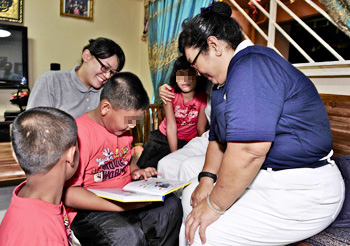
Liu Lian Qiu is a Chinese language teacher at the Tzu Chi Great Love PreSchool, and the much adored form teacher of the class of three-year-olds. (Photo by Bernard Ng)
“Good, good!” Bending over as she raises her thumb, eyes crinkled as she flashes a generous smile—that is the image of teacher Liu Lian Qiu that many people have. Liu is a Chinese language teacher at the Tzu Chi Great Love Preschool, and the form teacher of the class of three-year-olds. In the eyes of her students, Liu has been a great teacher ever since she started work at the PreSchool in 2014.
“Who helps you to bathe, sweep or scrub the floor? Who imparts knowledge to you?”
“The uncles and aunties (in Tzu Chi)! And the teachers!” Chirped the little children as they answered without hesitation.
“Good! So therefore you have to be grateful to the uncles and aunties who come here to help every day, as well as the teachers who teach you, right?” Liu had gathered the children around her, and with her interactive question and answer style, sought to explain to her students the significance of celebrating Teachers’ Day.
Loving Words of Encouragement Create Flowery Artworks
In Singapore, Teachers’ Day falls on the first Friday of September. This year, the three-year-old students, together with their older classmates, celebrated the event by presenting cups of tea and thank you cards to the staff at the Tzu Chi Great Love PreSchool and volunteers on duty.
In a flash of inspiration, Liu decided to put Tzu Chi’s philosophy of recycling into action and got her students to re-use the paper cups left over from the Parents’ Day celebrations to make the flower-shaped thank you cards.
“You must learn how to do this; paste (the materials) by yourself—good job! Go on, continue the good work!” Liu stood by, instructing and encouraging her students as she taught them how to create pretty little “flowers of gratitude” from the cups. Four to a group, the 17 children worked hard, each pair busily assembling the flower pieces.
“Do you prefer yellow or orange?” Liu got them all to pick the colour they liked at the start. She showed them the completed works of art done by their peers, as she encouraged them to work together on the project.
“Your flowers are looking good! Good work!” Liu never stopped the stream of loving encouragement, and after the children were done, she gathered them together again so that they could admire each other’s work.
Transformation of a Career Woman
It is hard to imagine how Liu, with almost 20 years of teaching experience, can formerly be a stern career woman putting in long hours at an advertising agency. The catalysts in her transformation are none other than her own children.
Then, she had just given birth to her daughter and had entrusted her in the care of her elderly mother. Subsequently, she wished to take care of the child herself but lacked the knowledge to do so. She finally decided to leave her busy job and look for one with shorter hours so she could start learning how to bring up her own child. Her teaching career started with a job as a teaching assistant, slowly working her way up to become a teacher.
In 2014, Liu was introduced to Tzu Chi by her ex-colleague Chong Ai Guan. She later became one of the Tzu Chi Great Love PreSchool teachers and had the opportunity to once again work with Chong, who is now the principal of the PreSchool.
Teaching by Example
Liu shares that teaching three-year-olds is a big change from teaching five- or six-year-olds. The Tzu Chi Great Love PreSchool places emphasis on imparting the right morals and ethics, and simply telling the children what they should or should not do is difficult as they have a limited understanding at that age.
She discovered that it was easier to teach by example, as children have a strong capacity to emulate what they see. There is no need to even explain the reasoning at times, as they will follow what the teacher does and gradually come to understand the reasoning behind the action.
To teach the concept of gratitude, she thanks her students each time she receives something from them. With such daily reminders, her students slowly learn the meaning of gratitude.
Teaching Through Careful Observation
At noon, after coaxing her students to take a nap, Liu goes through their individual booklets which details the communication she has with their parents. The contents include the child’s behaviour and performance, and even records the losing and finding of the child’s belongings. Sometimes she will prepare materials to teach her students Jing Si Aphorisms (wise sayings by Dharma Master Cheng Yen) by searching the Internet for related stories. When she encounters the usage of words that are more difficult to comprehend, she will incorporate the use of sign language. At times, she even makes up her own sign language so as to help her students understand the contents of what she teaches.
“The Jing Si Aphorisms help improve the children’s behaviour more rapidly.” Liu elaborated that when they were noisy, she used to remind them loudly to keep the volume down. However, she observed that it had the opposite effect as they would mimic the loud way in which she spoke.
Chancing upon the Jing Si Aphorism: “One should speak with words that are sincere and pleasant. Speaking gently, with sincerity and politeness, we afford each other mutual respect so that everyone can live in harmony,” Liu was impressed by the positive tone it contained. Now whenever her students are noisy, she will remind them that they have to be pleasant and gentle when they speak, and her students too, tend to remind each other in the same way.
“I think she is a very observant teacher,” said Huang Man Wei, the parent of a student. She praised Liu for noticing that her child tended to be overly fastidious about cleanliness from his toilet habits, when even she and her husband had not been aware. Liu analysed her child’s character and taught them how to help him overcome his peculiarity.
“Every child is different, so I don’t have a specific method of teaching. I use observation to find out the child’s strong and weak points,” said Liu. She gave the example of how some of her students were strong in linguistic skills but not as adept physically, so during exercise sessions she would give them time to learn the actions. If she had a student that tended to be quiet, she would let the child be seated beside a more talkative one so that even if he was not inclined to conversation, the child would be able to listen to and understand the joy of speech.
Giving Up Diapers for the Loo
At the age of three, it is time for a young child to learn how to use the toilet instead of relying on diapers. Yet for Ou Li Zhen (a parent of the Tzu Chi Great Love PreSchool), this is a big challenge. Seeing how her son’s peers had succeeded, she decided to let her son Liao Zhen Xian attend school one day sans his diapers, and that resulted in a very busy morning spent cleaning up by his teacher. Liu then approached Ou to suggest that when her son passed his third birthday in July, it would be the right time to wean him off his diapers.
Today, Ou happily explains that initially her son would not wear diapers starting from the afternoon, and the teacher would remind them to get him to go to the toilet when he reached home. Her son did as he was told and gradually learnt how to go to the toilet himself. A few weeks later, Liu felt that the little boy had settled into the routine and wrote down in the parent-teacher communication booklet of her student, requesting his parents to allow him to go without his diapers in the morning too. In addition, if he was not wearing diapers, he would have to inform his teacher or parents that he needed to use the toilet.
Ou is grateful for the help she received, and wrote a thank you letter to Liu. She elaborated that her son loved his teacher and wished to please, therefore he was keen to improve. When she asked him why he liked his teacher, he replied cheerfully that he thought Liu was funny.
To Liu, every little improvement made by her students can brighten up her day. As she puts it: “They only need to compare themselves now and in the past. If they have improved, I am happy; there is no need for them to be the best in class.”

Liu patiently guides her young students to create the flower artwork for Teachers’ Day. (Photo by Bernard Ng)

Liu teaches her students to sing a children’s song, accompanied by hand signs and body movement. (Photo by Bernard Ng)

On Teachers’ Day, students present little gifts of appreciation prepared by their parents to their teachers. Liu often expresses gratitude to her students and through teaching by example, ingrains the spirit of gratitude in them. (Photo by Bernard Ng)

The three-year-olds learn how to present tea to their teachers as they prepare for Teachers’ Day. (Photo by Bernard Ng)

As her little charges take their afternoon naps, Liu will check their booklets containing parent-teacher communication logs. (Photo by Bernard Ng)

Liu makes use of the opportunity to talk to her students’ parents when they turn up to bring their children home. (Photo by Bernard Ng)

Through making it a daily routine, Liu taught student Liao Zhen Xian how to fold his clothes and to use the toilet instead of relying on diapers. (Photo by Bernard Ng)



